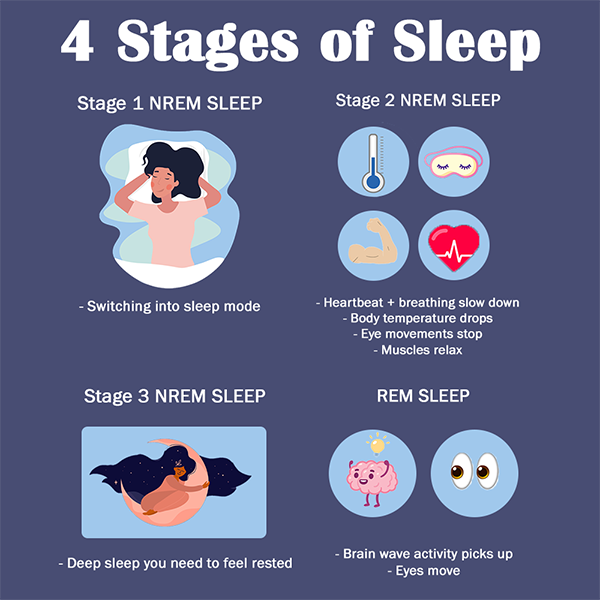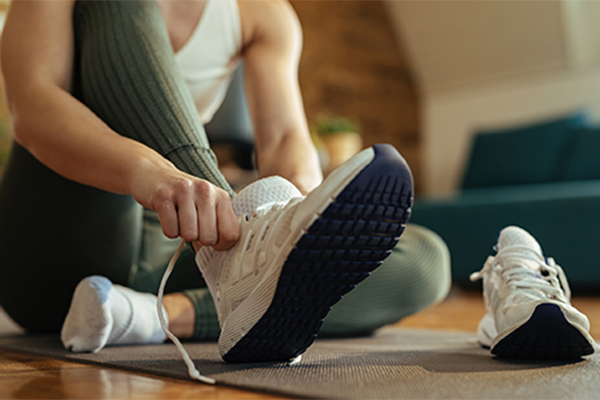
Sleeping is like eating: It’s essential to our survival, and starving yourself of sleep is a bad idea. Getting good-quality sleep is similar to good-quality nutrition.
We spend a lot of time learning about balanced diets, but what exactly constitutes a good night’s sleep?
Here are tips for how to get more sleep.
Benefits of Deep Sleep
Not getting enough sleep or the right kind of sleep is similar to eating only processed foods and added sugar. You’re probably not going to feel amazing, and, down the line, it could take a toll on your well-being.
The benefits of deep sleep are mental and physical. Sleep helps our muscles and minds recover and supports healthy weight, your immune system, and clear thinking, among other benefits, according to the U.S. Department of Health and Human Services.
What Are the Stages of Sleep?

When we sleep, our body cycles through two types of sleep marked by different brain waves:
Non-rapid-eye movement sleep (NREM)
Rapid-eye movement sleep (REM)
Throughout the night, you’ll have four to six 90-minute sleep cycles. Within each cycle, there are three stages of NREM sleep and a final period of REM sleep.
A sleep cycle consists of:
Stage 1 NREM sleep: This is a short period of light sleep, usually a few minutes, when your body switches into sleep mode.
Stage 2 NREM sleep: A period of light sleep moving toward deep sleep when your heartbeat and breathing slow down, muscles relax, body temperature drops, and eye movements stop.
Stage 3 NREM sleep: This is the period of deep sleep you need to really feel rested.
REM sleep: This happens around the 90-minute mark, and your brain wave activity picks up your eyes move, your breathing speeds up again.
Within these periods of sleep, the length of time also changes.
During the first half of the night, Stage 3 NREM or deep sleep occurs in more extended periods. As you get closer to morning, your REM phases get longer.
“It is speculated that NREM deep sleep has a greater restorative function,” says Dr. David Neubauer, M.D., a psychiatrist and sleep specialist at Johns Hopkins Medicine.
But research is still evolving on REM and NREM sleep.
Tips for Better Sleep
“Someone can lay in bed for 10 hours per night, but only sleep for five,” explains Dr. Khurshid A. Khurshid, M.D.
Broken sleep often becomes a vicious cycle, requiring retraining your body. Here are a few ways to help prime your body for better sleep.
1. Exercise at optimal times for sleep

Working out can help you sleep better, but exercising too close to bedtime reduces your ability to sleep deeply because it triggers hormones that energize us.
Morning, afternoon, and early evenings are your best bets for working out, recommends Khurshid.
2. Set yourself up for success
If you struggle to sleep, there are products like sleep masks and blackout curtains designed to help you get more Zs.
Finding the right mattress is also a crucial element to getting better sleep.
“What kind of mattress feels comfortable to you is personal, but choose one that meets your support needs,” says Khurshid.
3. Have an early dinner
Give your body plenty of time to digest before bedtime because digestion can disrupt sleep.
Studies suggest there may be a link between sleep disturbances and digestive issues.
4. Reduce screen time

Exposure to blue light from your devices can mess with your circadian rhythms, one of the mechanisms governing sleep along with sleep-wake homeostasis.
Lots of us stream TV shows or movies to snooze, but Khurshid recommends shifting this habit because it’s kind of like giving yourself jet lag.
5. Be mindful
So, what should you do instead of watching TV until you conk out on the couch?
Try mindful activities, such as:
Don’t know where to get started with meditation?
Soothe yourself to sleep with the vibrations and binaural beats of the guided Sound Meditation on BODi.
Use Scarlett de la Torre’s meditation techniques to relieve stress, improve your focus, and practice better self-care.
6. Skip the nightcap
A drink to unwind starts out great. It may help you fall asleep faster but then screws up the rest of your night.
“It initiates sleep, then disrupts sleep architecture,” explains Khurshid.